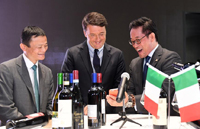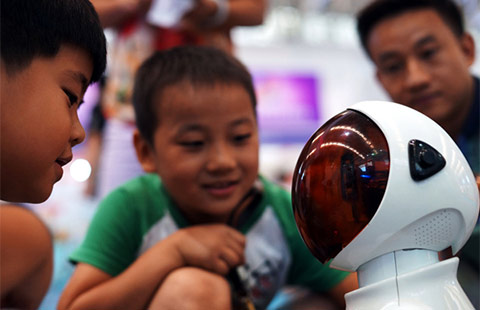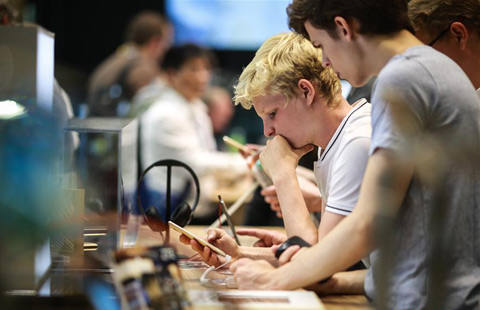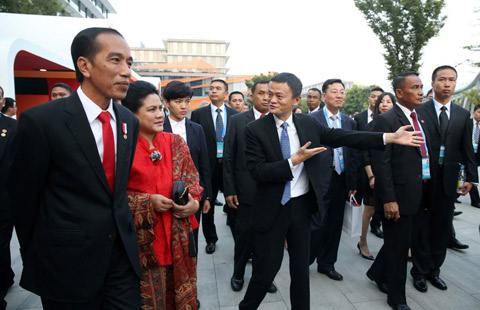China hosts G20 Summit, starting new journey for world's growth
(Xinhua) Updated: 2016-09-05 09:56HANGZHOU - Leaders of the world's 20 major economies on Sunday met in Hangzhou, discussing how to transform the lackluster global economy into the "innovative, invigorated, interconnected and inclusive" one, a vision proposed by the host country of China.
Around 3 pm, the leaders and heads of guest countries and international organizations joined Chinese President Xi Jinping to convene the 11th summit of the Group of 20 (G20).
This is the first time that the world's second largest economy took the presidency of the prime platform of global economic governance.
There are high hopes for this year's summit, as it seeks a transformation from crisis response, which focused on short-term policies, to one of long-term governance, which shapes medium- to long-term policies.
Eight years ago when the world was ravaged by the 2008 financial crisis, G20 Summit was launched for member cooperation on international economic and financial issues. The then plummeting world economy was stabilized and brought onto the track of recovery.
"Today, the world economy is once again at a critical juncture," said Xi when addressing the opening ceremony.
Despite the overall trend of economic recovery, multiple risks and challenges still exist, ranging from the lack of growth momentum and faltering demand to turbulent financial markets, he explained.
Against such a backdrop, Xi said he hoped the summit could find a therapy that can bring the world economy back on to a healthy growth trajectory.
"The therapy will be an integrative approach to address both the symptoms and root causes, and propel the world economy onto a path of robust, sustainable, balanced and inclusive growth," he said.
A variety of topics essential to the world economy are to be discussed at the two-day event, including macro-economic policy coordination, innovation-driven growth, more efficient world governance, robust trade and investment, and inclusive and interconnected development.
UN Secretary-General Ban Ki-moon appreciated President Xi and Chinese presidency for emphasizing sustainable development efforts as a core G20 Summit agenda at a press conference Sunday.
An action plan for implementing the 2030 Agenda for Sustainable Development is to be made at the summit, which features the participation of the largest ever number of developing economies.
Xi said the G20 should take the lead in major issues, working with real actions and without empty talk.
For the first time, the summit has put the issue of development front and center of the global macro policy framework, supporting the industrialization of African countries and least developed countries.
With two-thirds of the world's population, G20 contributes 90 percent of the world's total gross domestic product and 80 percent of the world's trade volume.
Over the past eight years, China has risen to become the world's second largest economy.
Wang Wen, executive dean of Chongyang Institute for Financial Studies with the Renmin University of China, sees the summit as "a landmark event in the history of China's diplomacy that reveals the growing influence and soft power of the country."
In its latest effort to facilitate sustainable development, China deposited the country's instrument to join the Paris Agreement with Ban Ki-moon on Saturday, together with the United States, paving the way for the early entry into force of the climate pact.
Xi proposed that the summit should strengthen coordination of macro-economic policies, facilitate economic expansion worldwide, safeguard financial stability, make innovations on growth patterns, tap new potential, optimize global economic governance and make institutional improvements.
The summit should also increase the openness of the world economy, facilitate trade and investment and boost inclusive development, he said.
Su Ge, president of the China Institute of International Studies, expects the Hangzhou summit to open a new chapter in global economic governance and engage both developed and developing countries.
Sources with China's Foreign Ministry said that significant consensus had been achieved in the first-phase meeting presided over by Xi on Sunday afternoon, focusing on policy coordination and innovative growth.
After the meeting, Xi and the other leaders and guests took a boat trip and enjoyed a leisure moment lightened by glitzy performance and fireworks display on the bank of Hangzhou's landmark West Lake.
Nevertheless, in his speech, Xi mentioned the boat metaphorically to stress the need of joint efforts to overcome difficulties.
"To brave through the rough waters of world economy and start a new journey for future growth, it's good to know that we are in the same boat," he said.
- China hosts G20 Summit, starting new journey for world's growth
- B20 summit concludes with many consensuses, results
- New issue a landmark for Special Drawing Rights
- Guests attending G20 summit have boat trip in West Lake
- Hangzhou a top choice for overseas returnees
- No basis seen for long-term drop in Chinese currency
- Xi shows confidence in global economy at B20
- Those at risk of climate damage praise agreement

















